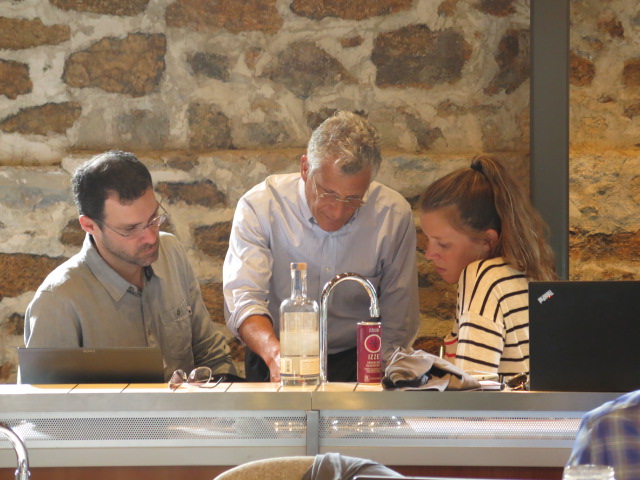News



Will Rosenzweig on Food-Based Businesses
Yahoo! Small Business Advisor | Posted: 08/21/2015
Creating Success We asked Will to identify the three primary things that tip him off that a given venture, in its startup phase, is likely to be successful. “Okay,” he said with a smile. “One: People. Two: People. And three: People. It’s really all about people.” Food attracts a lot of artsy, creative types, says Will—“people who don’t necessarily know how to bring their creativity together with the disciplines of business execution and financial rigor.” At the Food Business School, he and his colleagues help build entrepreneurial teams. “We are on the lookout for people,” says Will, “who have the grit, commitment and vision required for success.” Here’s what Will Rosenzweig told Yahoo about the five most common mistakes made by food industry start-ups: Not accurately sizing the market and the opportunity: “It’s more difficult than you might think to identify how many people will be interested in your product.” Underestimating the challenge of acquiring customers in an overcrowded market. Underestimating the amount of time and capital required to be successful. Underestimating the complexity of assembling a high-quality team and bringing them to a high level of performance. Mistaking the head-nod of excitement for true market validation: “Just because a rep from Whole Foods tells you that he loves your product, there’s no guarantee that Whole Foods is going to put your product on their shelves.” With its large and flexible array of courses and certificate programs, the Food Business School serves people at different stages of their entrepreneurial journey: those who want to explore and polish an idea for a business; those who are ready to pressure-test an idea; and those who are already in the early stages of their business—and/or are looking to be acquired. The bottom line? “You have to be able to do a lot of things right to turn a food product into a scalable business.”
View original article here.
Photo Credit: Food Business School
[ssba]
Press Release



Will Rosenzweig on Food-Based Businesses
Posted: 08/21/2015
Is this a good time to start a food-related business? Increasingly, savvy consumers are pushing their shopping carts past the center aisles of the grocery store—away from the Big Brands and their packaged foods that seduced the public with convenience in exchange for chemical additives widely suspected both of compromising our health and making us fat. Long-time food industry insiders are calling this “the most dynamic, disruptive, and transformational time” of their careers. Iconic American food manufacturers, desperate to paint their public image green—and, in the process, re-gain market share—are paying big bucks to populate their corporate houses with the most promising, sustainable, well-thought-out natural-foods ventures that money can buy. Sounds like easy pickings for someone with a delicious family recipe or a great new disruptive idea that will change and improve the way we eat, doesn’t it? Yahoo cornered internationally award-winning food activist, social entrepreneur and investor Will Rosenzweig, Dean of the Food Business School of the Culinary Institute of America, to get his expert advice about entering this market and competing successfully. Is this a good time, we wanted to know, to start a food-based venture? Will gave us his first answer to our question—the Zen answer—with a story about a transformational moment from his past, long before he himself became a trusted elder statesman in the world of socially conscious, disruptive food startups. It was 1990. Will Rosenzweig was a young, idealistic entrepreneur attending his first Social Venture Network conference, where he profited from the wisdom and advice of a star-studded lineup of company founders and CEOs with roots in the peace activism of the 1960s. “Ben Cohen, of Ben and Jerry’s, was there. Gary Erickson, of Clif Bar; Paul Hawken, of Smith & Hawken; and Gary Hirshberg, of Stonyfield Farm, were there. Jeffrey Hollender, of Seventh Generation, and Paul Katz, of Rockport Shoes, were there, too. All of them had set out to create brands that had a purpose and a cause to them. But instead of protesting, they were trying to do it with profit.” Will found his mentor at that conference, Mel Ziegler, the founder of Banana Republic who became co-founder, with Will Rosenzweig and Patricia Ziegler, of the Republic of Tea. “I asked Mel,” Will told Yahoo, “‘When is the right time to start a business?’ And his response was, ‘Never and always.’” The same enigmatic answer apparently holds true now. “On the one hand,” says Will, “it’s a great time to start a food business. Barriers to entry are relatively low. But there’s so much competition out there now, that it’s disproportionately difficult to scale up and succeed.” Will, who won the Oslo Business for Peace Award in 2010, admits that he’s “somewhat perturbed with people who think they’ve just now discovered the business model of ‘doing good while doing well,’ which has been around for the past 25 years.” He notes, however, a huge and significant shift in the psychic landscape of the professional world since then. “The millennial generation is the first generation willing to trade upside on their compensation for meaning in their lives. They would rather make less money doing meaningful work than work for more money in a soulless job.” image Health and Sustainability Food, says Will Rosenzweig, is “the quintessential and catalytic substance that now makes the two biggest issues of our time personal: health and sustainability. We finally understand—the Buddhists have been saying this for 3,000 years—that everything is interconnected. Now we have empirical proof that the way we grow our beef has a huge impact on the quality of our air. The way we fertilize our crops has a huge impact on the fertility of our soil, which ultimately affects the nutritional quality of our food, which affects our heart, our cholesterol, our immune system. The epiphany has been that we should really care about these issues.” We asked the UC Berkeley Haas School of Business professor to zero in on the “doing well” part of the equation. After all, entrepreneurs from all over the world are turning to the Food Business School for help in starting or expanding a business in what the school’s founder calls “this really magical sector at the crossroads of the two biggest issues of our time.” An avid organic gardener with one foot in a very contemplative world, Will Rosenzweig is nonetheless a tough critic and coach when it comes to making sure that would-be entrepreneurs are well prepared to face the scrutiny and skepticism of investors. He’s an investor himself. One of the hats he wears is as co-founder and managing partner of Physic Ventures, touted as the first venture capital firm dedicated to projects and products that promote global human health. He knows the small business landscape from both sides of the table, as someone who has been closely involved in the beginnings of many companies in the health and sustainability sector —and as someone trying to identify the new business ventures most likely to succeed. Many new entrepreneurs make the mistake, Will told us, of going to investors with a product that is simply not differentiated enough from other similar products already out there. “Because everybody eats, everybody thinks they’re a food expert. But starting a food business is a lot harder than it looks.” Before you even think about approaching investors, cautions Will, you need to acquire a thorough understanding of these seven essential areas of knowledge as they relate to your product or service:Creating Success We asked Will to identify the three primary things that tip him off that a given venture, in its startup phase, is likely to be successful. “Okay,” he said with a smile. “One: People. Two: People. And three: People. It’s really all about people.” Food attracts a lot of artsy, creative types, says Will—“people who don’t necessarily know how to bring their creativity together with the disciplines of business execution and financial rigor.” At the Food Business School, he and his colleagues help build entrepreneurial teams. “We are on the lookout for people,” says Will, “who have the grit, commitment and vision required for success.” Here’s what Will Rosenzweig told Yahoo about the five most common mistakes made by food industry start-ups: Not accurately sizing the market and the opportunity: “It’s more difficult than you might think to identify how many people will be interested in your product.” Underestimating the challenge of acquiring customers in an overcrowded market. Underestimating the amount of time and capital required to be successful. Underestimating the complexity of assembling a high-quality team and bringing them to a high level of performance. Mistaking the head-nod of excitement for true market validation: “Just because a rep from Whole Foods tells you that he loves your product, there’s no guarantee that Whole Foods is going to put your product on their shelves.” With its large and flexible array of courses and certificate programs, the Food Business School serves people at different stages of their entrepreneurial journey: those who want to explore and polish an idea for a business; those who are ready to pressure-test an idea; and those who are already in the early stages of their business—and/or are looking to be acquired. The bottom line? “You have to be able to do a lot of things right to turn a food product into a scalable business.”
[ssba]



